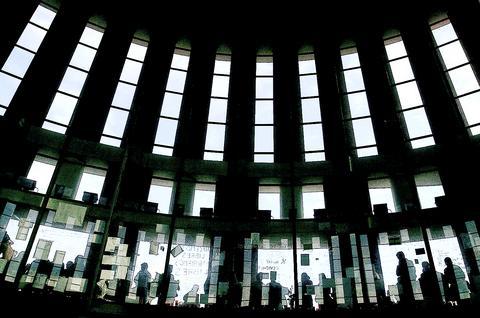Thousands of Spaniards were expected to join anti-war marches on the anniversary of the Iraq invasion yesterday as police continued to hunt suspects over the devastating Madrid train bombings.
Protests were scheduled across Europe a year after coalition troops launched the invasion to seek out Iraq's alleged weapons of mass destruction and topple the brutal regime of Saddam Hussein.

PHOTO: AP
But they were to take on an added sense of poignancy in Madrid, still reeling from Spain's worst ever terror attack on March 11, when suspected Islamic extremists killed 202 people in a series of blasts on commuter trains.
The attacks led to the downfall of Spain's pro-US government in elections three days later and rocked the US-led coalition in Iraq, with the incoming government vowing to withdraw Spanish troops by June without a UN mandate.
The Madrid bombings, the worst terror attack in Europe in 15 years, have fueled fears that terrorists are bent on hurting countries which support the US-led coalition in Iraq, particularly in Britain, Italy and Poland.
Prime minister-elect Jose Luis Rodriguez Zapatero, who won last weekend's elections on a wave of anti-war anger heightened by the carnage here, has described the occupation of Iraq as a "fiasco."
His threat to pull the country's 1,300 troops out of Iraq is an about-face for one of the main supporters in Europe of the US-led "coalition of the willing," and has led to criticism from some quarters that Madrid has caved in to terrorists.
"It's difficult to avoid the conclusion that this has been a victory for international terrorism because the [election] result seems directly attributable to the attacks," Brookings Institution senior fellow Philip Gordon told El Pais newspaper.
US President George W. Bush, in a speech on Friday to mark the first anniversary of the Iraq invasion, said there could be no "separate peace with the terrorist enemy" and warned against "any sign of weakness or retreat".
But incoming Spanish foreign minister Miguel Angel Moratinos told broadcaster CNN that Spain's proposed withdrawal of troops from Iraq did not mean it was renouncing the struggle against terrorism.
"Repatriating 1,300 soldiers does not mean that Spain is modifying its commitment to the struggle against terrorism," he said late Friday.
"It is not going to change the future of Iraq. This is a false debate. What is up for debate is how we can reinforce the political and democratic process and security in Iraq."
Spanish police are seeking four Moroccans who are believed to have stolen the explosives used in the Madrid bombings, the daily El Pais reported yesterday.
The only Spanish national detained in connection with the March 11 bombings has told investigators he drove the attack's plotters to a mine in the northern town of Asturies a Aviles where 100kg of explosives were stolen in February, a source close the investigation told the daily.
A former miner with a record of drugs trafficking and illegal arms possession, he said he met the Moroccans in January in a Madrid bar.
They had said they were searching for explosives for use in a mine in Morocco, and the Spaniard told them he knew where unguarded explosives could be found and later drove them to the site.
Ten people have been detained in connection with last week's bombings.

PRECARIOUS RELATIONS: Commentators in Saudi Arabia accuse the UAE of growing too bold, backing forces at odds with Saudi interests in various conflicts A Saudi Arabian media campaign targeting the United Arab Emirates (UAE) has deepened the Gulf’s worst row in years, stoking fears of a damaging fall-out in the financial heart of the Middle East. Fiery accusations of rights abuses and betrayal have circulated for weeks in state-run and social media after a brief conflict in Yemen, where Saudi airstrikes quelled an offensive by UAE-backed separatists. The United Arab Emirates is “investing in chaos and supporting secessionists” from Libya to Yemen and the Horn of Africa, Saudi Arabia’s al-Ekhbariya TV charged in a report this week. Such invective has been unheard of

US President Donald Trump on Saturday warned Canada that if it concludes a trade deal with China, he would impose a 100 percent tariff on all goods coming over the border. Relations between the US and its northern neighbor have been rocky since Trump returned to the White House a year ago, with spats over trade and Canadian Prime Minister Mark Carney decrying a “rupture” in the US-led global order. During a visit to Beijing earlier this month, Carney hailed a “new strategic partnership” with China that resulted in a “preliminary, but landmark trade agreement” to reduce tariffs — but

Chinese President Xi Jinping’s (習近平) purge of his most senior general is driven by his effort to both secure “total control” of his military and root out corruption, US Ambassador to China David Perdue said told Bloomberg Television yesterday. The probe into Zhang Youxia (張又俠), Xi’s second-in-command, announced over the weekend, is a “major development,” Perdue said, citing the family connections the vice chair of China’s apex military commission has with Xi. Chinese authorities said Zhang was being investigated for suspected serious discipline and law violations, without disclosing further details. “I take him at his word that there’s a corruption effort under

China executed 11 people linked to Myanmar criminal gangs, including “key members” of telecom scam operations, state media reported yesterday, as Beijing toughens its response to the sprawling, transnational industry. Fraud compounds where scammers lure Internet users into fake romantic relationships and cryptocurrency investments have flourished across Southeast Asia, including in Myanmar. Initially largely targeting Chinese speakers, the criminal groups behind the compounds have expanded operations into multiple languages to steal from victims around the world. Those conducting the scams are sometimes willing con artists, and other times trafficked foreign nationals forced to work. In the past few years, Beijing has stepped up cooperation